【广东学导练】2015-2016学年英语牛津深圳版七年级下册课件Unit 3 Our animal friends(共32张PPT)
文档属性
| 名称 | 【广东学导练】2015-2016学年英语牛津深圳版七年级下册课件Unit 3 Our animal friends(共32张PPT) |  | |
| 格式 | zip | ||
| 文件大小 | 94.7KB | ||
| 资源类型 | 教案 | ||
| 版本资源 | 牛津深圳版 | ||
| 科目 | 英语 | ||
| 更新时间 | 2016-07-05 22:07:24 | ||
图片预览

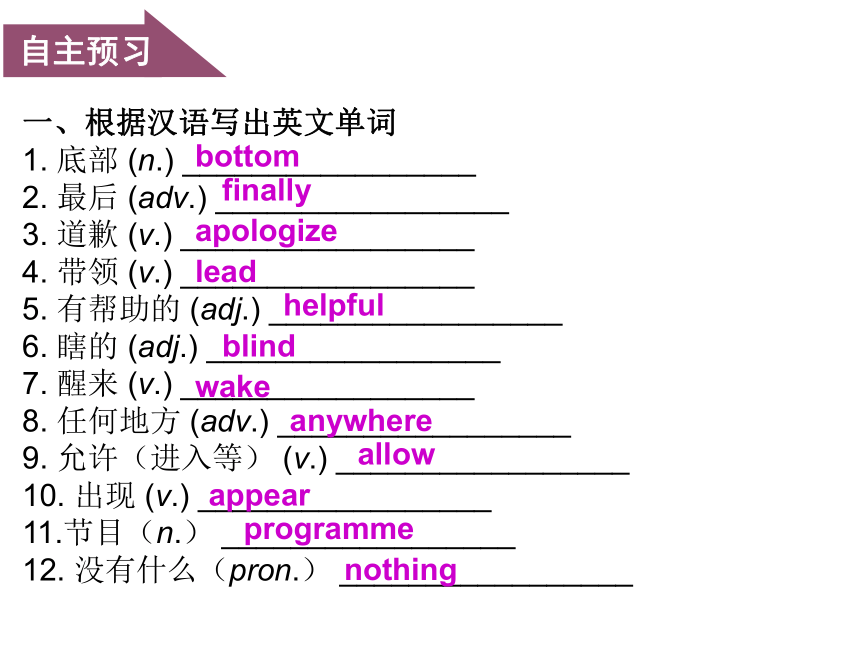
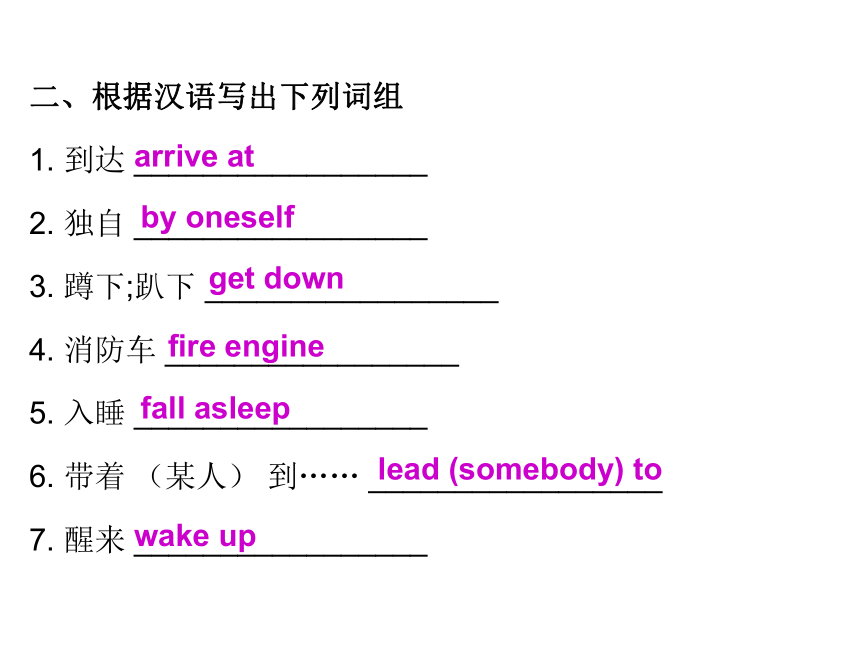
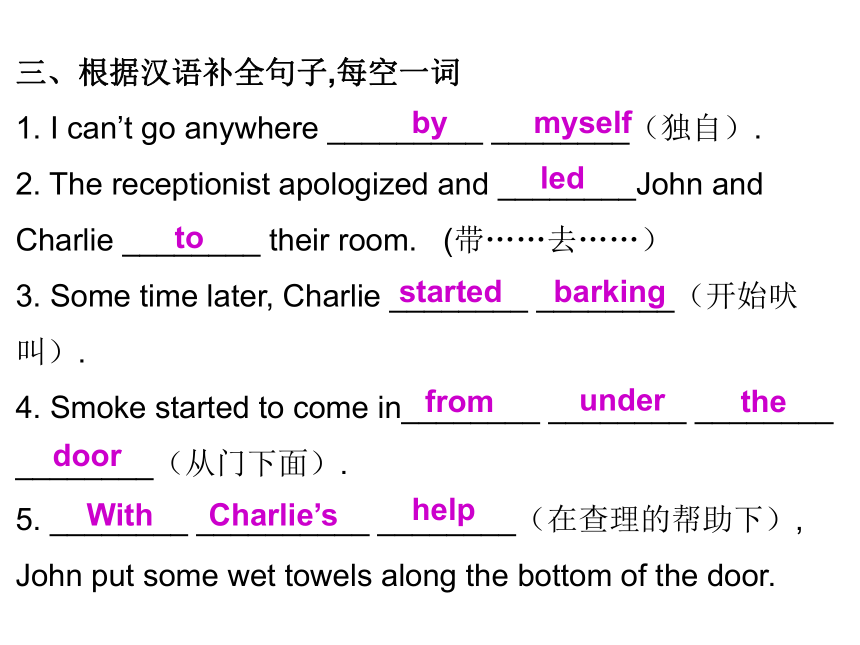
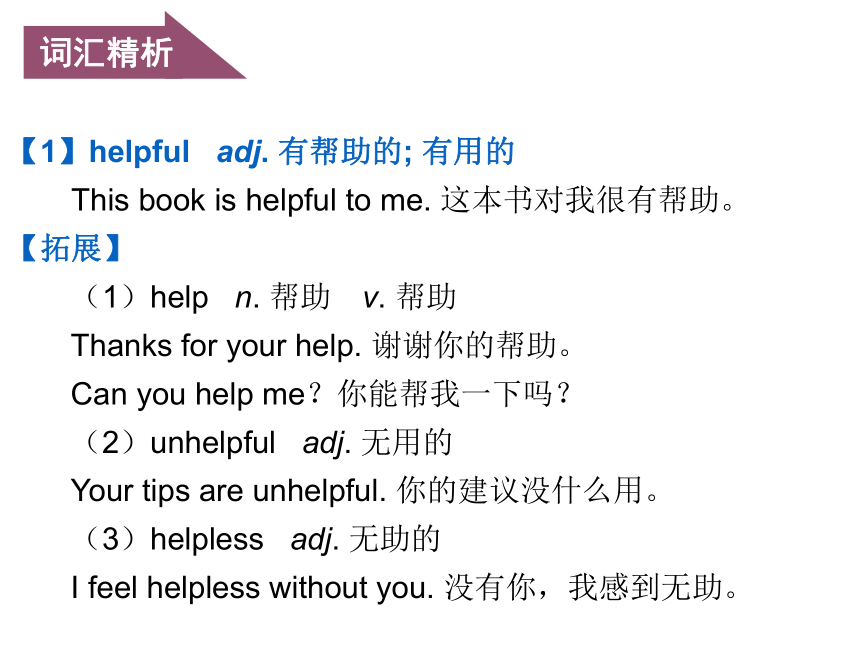
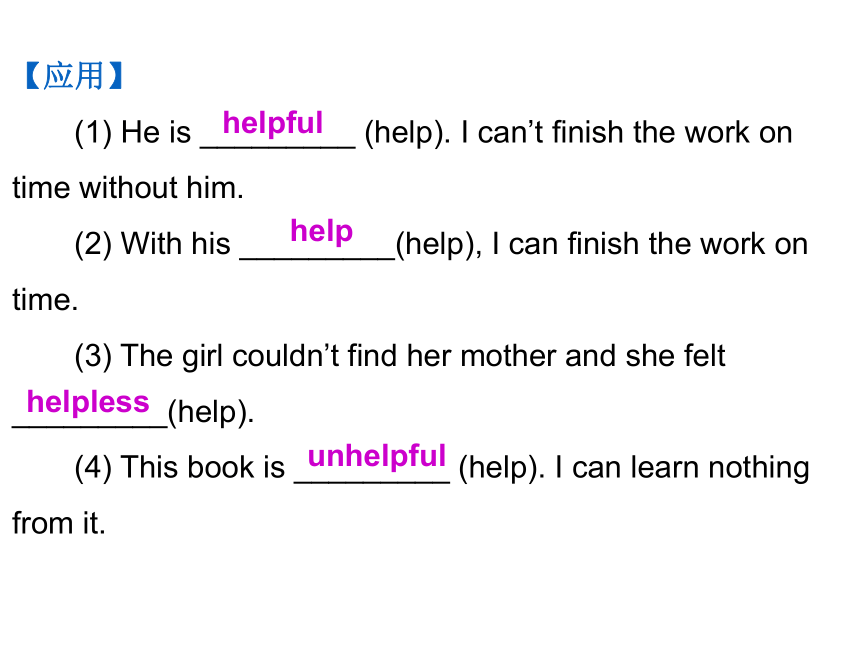
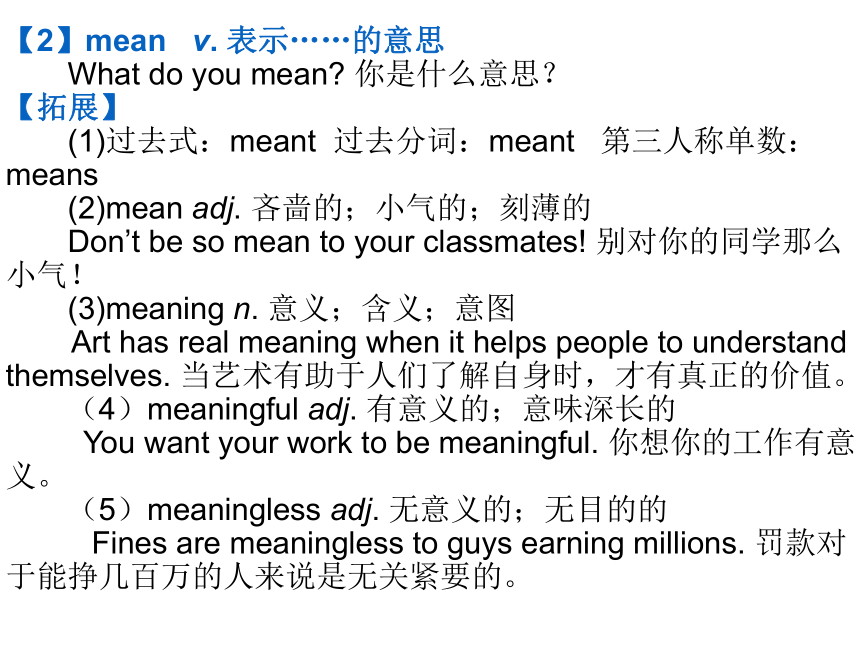

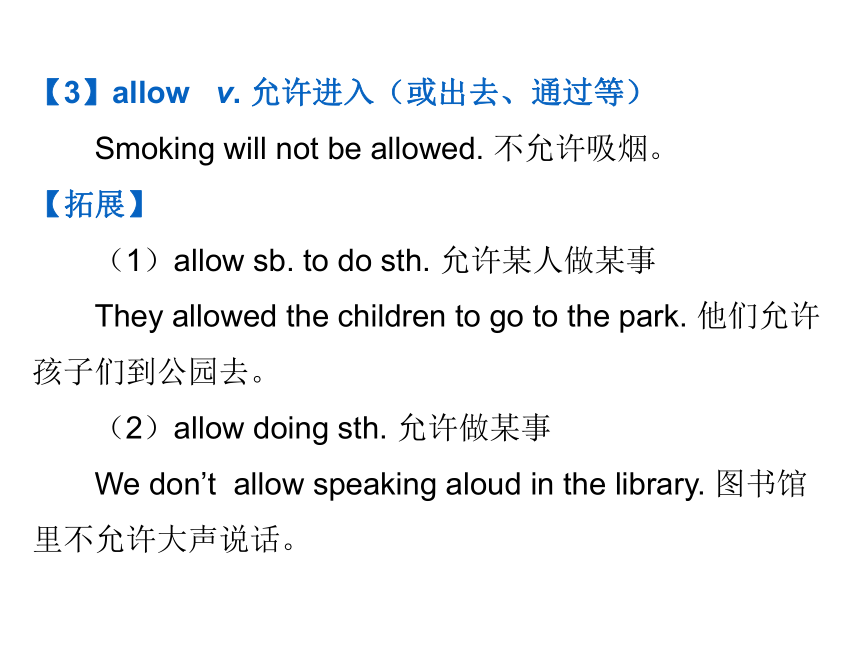
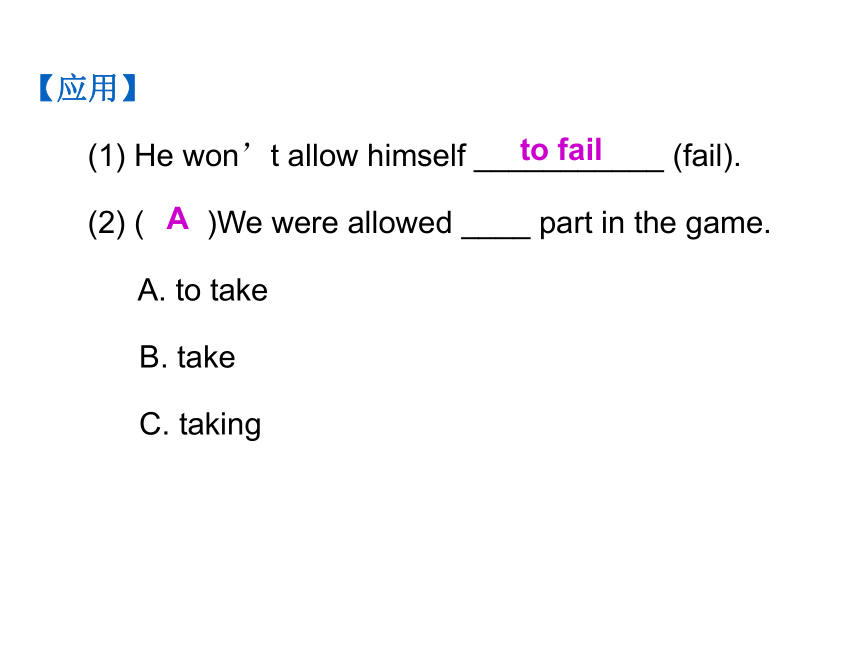
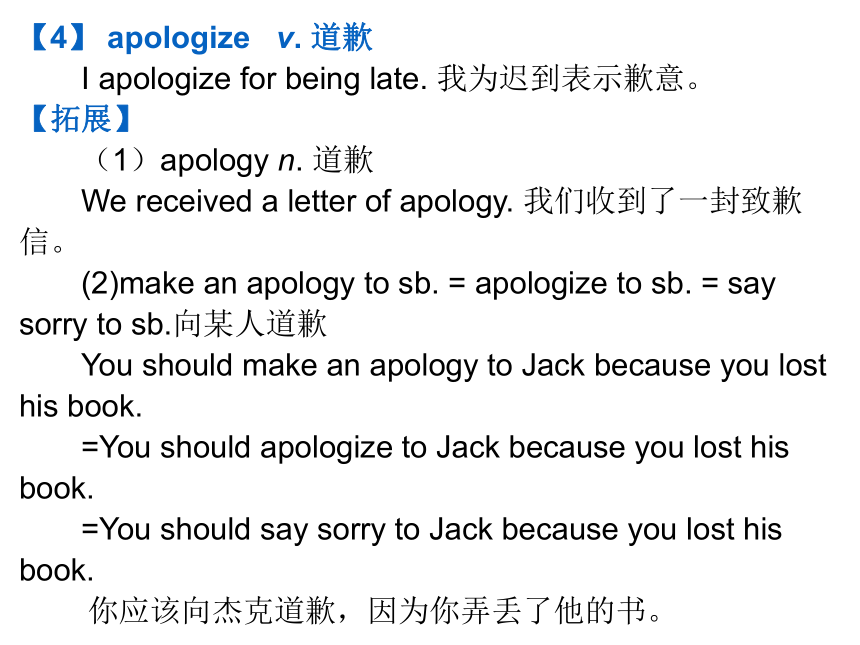
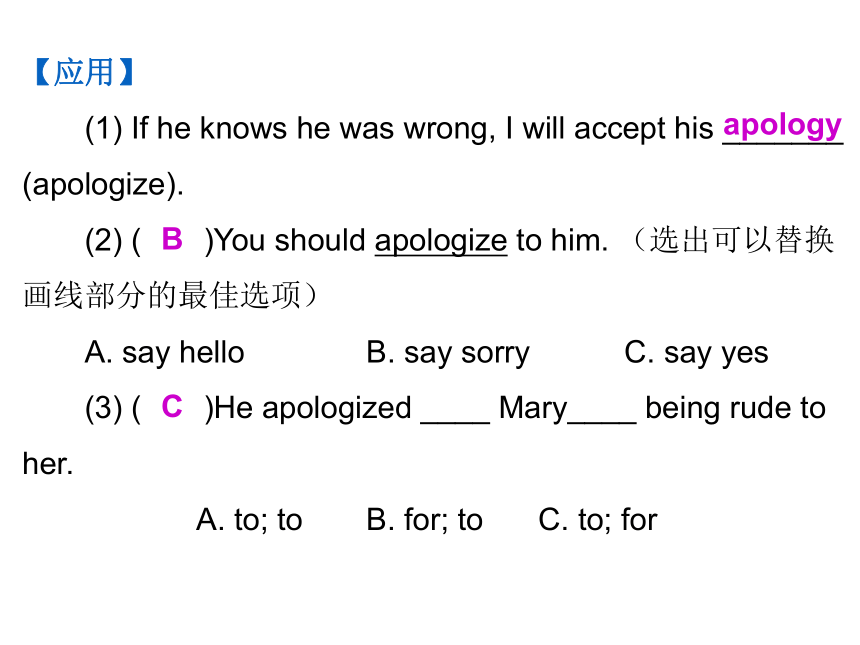
文档简介
课件32张PPT。Unit 3 Our animal friendsModule 2 Man’s best friends自主预习一、根据汉语写出英文单词
1. 底部 (n.) _________________
2. 最后 (adv.) _________________
3. 道歉 (v.) _________________
4. 带领 (v.) _________________
5. 有帮助的 (adj.) _________________
6. 瞎的 (adj.) _________________
7. 醒来 (v.) _________________
8. 任何地方 (adv.) _________________
9. 允许(进入等) (v.) _________________
10. 出现 (v.) _________________
11.节目(n.) _________________
12. 没有什么(pron.) _________________bottomfinallyapologizeleadhelpfulblindwakeanywhereallowappearprogrammenothing二、根据汉语写出下列词组
1. 到达 _________________
2. 独自 _________________
3. 蹲下;趴下 _________________
4. 消防车 _________________
5. 入睡 _________________
6. 带着 (某人) 到…… _________________
7. 醒来 _________________arrive atby oneselfget downfire enginefall asleeplead (somebody) towake up三、根据汉语补全句子,每空一词
1. I can’t go anywhere _________ ________(独自).
2. The receptionist apologized and ________John and Charlie ________ their room. (带……去……)
3. Some time later, Charlie ________ ________(开始吠叫).
4. Smoke started to come in________ ________ ________ ________(从门下面).
5. ________ __________ ________(在查理的帮助下), John put some wet towels along the bottom of the door.bymyselfledtostartedbarkingfromunderthedoorWithCharlie’shelp词汇精析【1】helpful adj. 有帮助的; 有用的
This book is helpful to me. 这本书对我很有帮助。
【拓展】
(1)help n. 帮助 v. 帮助
Thanks for your help. 谢谢你的帮助。
Can you help me?你能帮我一下吗?
(2)unhelpful adj. 无用的
Your tips are unhelpful. 你的建议没什么用。
(3)helpless adj. 无助的
I feel helpless without you. 没有你,我感到无助。【应用】
(1) He is _________ (help). I can’t finish the work on time without him.
(2) With his _________(help), I can finish the work on time.
(3) The girl couldn’t find her mother and she felt _________(help).
(4) This book is _________ (help). I can learn nothing from it.helpfulhelphelplessunhelpful 【2】mean v. 表示……的意思
What do you mean? 你是什么意思?
【拓展】
(1)过去式:meant 过去分词:meant 第三人称单数:means
(2)mean adj. 吝啬的;小气的;刻薄的
Don’t be so mean to your classmates! 别对你的同学那么小气!
(3)meaning n. 意义;含义;意图
Art has real meaning when it helps people to understand themselves. 当艺术有助于人们了解自身时,才有真正的价值。
(4)meaningful adj. 有意义的;意味深长的
You want your work to be meaningful. 你想你的工作有意义。
(5)meaningless adj. 无意义的;无目的的
Fines are meaningless to guys earning millions. 罚款对于能挣几百万的人来说是无关紧要的。【应用】
(1) We should make our life _____________ (mean).
(2) We should find out the _________ (mean) of our life.
(3) We should know what this word _________ (mean).
(4) They think his work is _____________ (mean), but he keeps on doing it.meaningfulmeaningmeansmeaningless【3】allow v. 允许进入(或出去、通过等)
Smoking will not be allowed. 不允许吸烟。
【拓展】
(1)allow sb. to do sth. 允许某人做某事
They allowed the children to go to the park. 他们允许孩子们到公园去。
(2)allow doing sth. 允许做某事
We don’t allow speaking aloud in the library. 图书馆里不允许大声说话。【应用】
(1) He won’t allow himself ___________ (fail).
(2) ( )We were allowed ____ part in the game.
A. to take
B. take
C. taking to failA 【4】 apologize v. 道歉
I apologize for being late. 我为迟到表示歉意。
【拓展】
(1)apology n. 道歉
We received a letter of apology. 我们收到了一封致歉
信。
(2)make an apology to sb. = apologize to sb. = say sorry to sb.向某人道歉
You should make an apology to Jack because you lost his book.
=You should apologize to Jack because you lost his book.
=You should say sorry to Jack because you lost his book.
你应该向杰克道歉,因为你弄丢了他的书。【应用】
(1) If he knows he was wrong, I will accept his _______ (apologize).
(2) ( )You should apologize to him. (选出可以替换画线部分的最佳选项)
A. say hello B. say sorry C. say yes
(3) ( )He apologized ____ Mary____ being rude to her.
A. to; to B. for; to C. to; forapologyBC【5】lead v. 带领
He leads her into the house. 他把她带到房子里。
【拓展】
(1)过去式:led 过去分词:led
(2)leader n. 领导者;首领;指挥者
As the leader of this office, she can work with everyone. 作为这间办公室的领导,她和每个人都合作得很好。
【应用】
(1) We need a good _________ (lead) in our team.
(2) ( )He led us to a house.(选出可以替换画线部分的最佳选项)
A. took; for B. brought; for C. took; to leaderC【6】wake v. 醒来
It was cold and dark when I woke at 6:30. 我6点30分醒来时,天又冷又黑。
【拓展】
(1)过去式:woke 过去分词:woken
(2)awake v. 唤醒;使觉醒;激起,唤起 adj. 醒着的
Nothing can awake her interest in this trip. 没有东西可以唤起她对这次旅行的兴趣。
I don’t stay awake at night worrying about that. 我才不会彻夜不眠为那事儿担心呢。
【应用】
(1) We need to keep _________ (wake) when we do
this job.
(2) ( )I couldn’t fall ____ last night, so I ____ up
late this morning.
A. sleep; awake B. asleep; awake
C. asleep; wokeawakeC 【7】finally adv. 最后;终于
I finally beat him in that match. 最后我在那场比赛中打败了他。
【拓展】
(1)final adj. 最后的 n. 决赛
This is our final goal. 这就是我们最后的目的。
I know I was one point away from getting to the US Open Final. 我知道我离美网决赛只有一分之差。
(2)finally=at last=in the end 最后
Finally, he made it.
=At last, he made it.
=In the end, he made it. 最后,他成功了。【应用】
(1)We need to get ready for our ________ (finally) exam.
(2)( )He finally finished his book.(选出可以替换画线部分的最佳选项)
A. at the end
B. at most
C. at lastfinalC【8】appear v. 出现
A woman appeared at the end of the street. 一个女人在街尾出现了。
【拓展】
appearance 外貌,外观;出现,露面
disappear v. 消失
The car is not bad in appearance. 这辆小汽车外表看起来还不赖。
At the appearance of the enemy, we attacked. 敌人一出现,我们就发起了攻击。【应用】
(1)The man ______________ (appear), and he never came back.
(2)We care so much about our _______________ (appear).
(3)( )She is a TV hostess and she appears on TV every night.(选出可以替换画线部分的最佳选项)
A. takes on B. shows up C. looks up disappearedappearanceB【9】bottom n. 底部
The ship sank to the bottom of the sea. 船沉到了海底。
【拓展】from top to bottom 从上到下;完全地
She would clean the house from top to bottom. 她会把房子彻底打扫一下。
【应用】
( )Answers can be found at the ____ of Page 11.
A. centre B. top C. bottomC【10】climb v. 攀登;攀爬 n. 攀登
They started to climb the mountain in the early morning.
他们一大早就开始了爬山。
He made a difficult climb. 他做了一次艰难的攀登。
【应用】
I like _________________(climb) mountains on weekends.climbing/to climb语法梳理语法精讲反身代词(reflexive pronouns)
1. 反身代词构词法:-self/-selves。
第一、二人称由形容词性物主代词加-self/-selves;第三人称由宾格加-self/-selves。详见下表: 2. 反身代词放在动词或介词后作宾语,指代主语本身,宾语和主语是同一人。如:
He blames himself for the mistake. 他为所犯的错误自责。
She made herself a cup of tea. 她为自己沏了一杯茶。
We should not think only of ourselves. 我们不能只考虑自己。
3. 用反身代词强调“亲自;本人”,放在主语后或句末作同位语。如:
He did the homework himself. 他独自完成了作业。
We ourselves can clean the kitchen. 我们自己就可以清理厨房。
4. by加反身代词强调“独立;没有帮助”,放在句末。如:
We must do it by ourselves. 我们必须独立完成。 5. 常见短语:
enjoy oneself 玩得开心
by oneself 独自
teach oneself 自学
talk/say to oneself 自言自语
think of oneself 考虑自己
help oneself to... 请随便吃点……
lose oneself in... 沉迷于……
dress oneself 给自己穿衣服
introduce oneself 介绍自己
make oneself at home别拘束
hurt oneself 伤害自己方位介词(prepositions of position)
方位介词就是用来介绍位置的介词。中学阶段比较重要的方位介词有:
1. in在大地方; at 在小地方
He arrived in Shenzhen yesterday. 他昨天到了深圳。
He arrived at the village yesterday. 他昨天到了乡下。
2. in在里面; on相接壤; to 相离
Shenzhen lies/is in the south of China. 深圳位于中国南部。
Guangdong lies/is on the east of Guangxi. 广东位于广西东边。
Japan lies/is to the east of China. 日本位于中国东边。 3. in在里面,out(of) 在外面; inside在里面; outside在外面
There is a book in/inside the box. 箱子里有一本书。
There is a book out of/outside the box. 箱子外有一本书。
4. on 在……上面,两者紧贴; over 在……(正)上方,两者垂直悬空不接触; above 在……上方,高于……
There is a book on the desk. 书桌上有一本书。
There is a bridge over the river. 河上有一座桥。
The plane flies above the clouds. 飞机在云层上飞。
5. over在……上方;under在……下方,和over是反义词
There is a light over the desk. 书桌上方有一盏灯。
There is a book under the desk. 书桌下方有一本书。 6. above在……上方,高于……;below在……下方,低于……, 和above是反义词
The plane flies above the clouds. 飞机在云层上飞。
The plane flies below the clouds. 飞机在云层下飞。
7. behind 在……后面;in front of 在……前面,和behind是反义词;in the front of 在……前部(在内部靠前的地方)
There is a tree behind the house. 房子后面有一棵树。
There is a tree in front of the house. 房子前面有一棵树。
There is a table in the front of the room. 房间的前部有一张桌子。 8. next to紧靠着; beside/by /near在旁边,在附近
The little girl sat next to her mother. 小女孩紧挨着妈妈坐着。
There is a house beside/by/near the river. 河的附近有一座房子。
9. between 在两者之间; among 在……(三者及以上)之间
He is standing between you and me. 他站在你我之间。
He is standing among us. 他站在我们之间。
10. in the tree在树上(外来物); on the tree在树上(原生物):
There are some birds in the tree. 树上有很多小鸟。
There are some flowers on the tree. 树上有很多花。直击中考( )1. On May 10th, a horse was found running
happily____ the busy street in Beijing. (2014东营)
A. at B. of C. in D. from
( )2. Don’t worry. We’re old enough to look
after____. (2014陕西)
A. myself B. me C. ourselves D. us
( )3. The castle stands in a quiet place____the main
road at the far end of the river.(2014苏州)
A. to B. for C. off D. outCCC写作乐园话题三 我最喜欢的动物
【常用词组】
1. not only...but also... 不仅……而且……
2. take it for a walk带它去散步
3. take care of sb. 照顾某人
4. play with it 和它玩
5. be good at 擅长【精彩句型】
1. I like...best. 我最喜欢……
2. I have a...called... 我有一只叫作……的……
3. It likes to eat...and drink... 它喜欢吃……喝……【短文写作】
请你以“My favourite animal”为题写一篇短文,描述一下你最喜欢的动物。要求标点正确,条理清楚,意思连贯,语句通顺,60词左右。【范文赏析】
My favourite animal
My favourite animal is a cat. I have a cat in my family. Her name is Mimi. I think she is from China. She is two years old now. She is a brown and white cat. She likes to eat fish every day. She is kind of lazy, but she is very cute. I like playing with it after school. Mimi is not only my favourite
cat but also my friend. I will take care of it forever.谢谢欣赏!
1. 底部 (n.) _________________
2. 最后 (adv.) _________________
3. 道歉 (v.) _________________
4. 带领 (v.) _________________
5. 有帮助的 (adj.) _________________
6. 瞎的 (adj.) _________________
7. 醒来 (v.) _________________
8. 任何地方 (adv.) _________________
9. 允许(进入等) (v.) _________________
10. 出现 (v.) _________________
11.节目(n.) _________________
12. 没有什么(pron.) _________________bottomfinallyapologizeleadhelpfulblindwakeanywhereallowappearprogrammenothing二、根据汉语写出下列词组
1. 到达 _________________
2. 独自 _________________
3. 蹲下;趴下 _________________
4. 消防车 _________________
5. 入睡 _________________
6. 带着 (某人) 到…… _________________
7. 醒来 _________________arrive atby oneselfget downfire enginefall asleeplead (somebody) towake up三、根据汉语补全句子,每空一词
1. I can’t go anywhere _________ ________(独自).
2. The receptionist apologized and ________John and Charlie ________ their room. (带……去……)
3. Some time later, Charlie ________ ________(开始吠叫).
4. Smoke started to come in________ ________ ________ ________(从门下面).
5. ________ __________ ________(在查理的帮助下), John put some wet towels along the bottom of the door.bymyselfledtostartedbarkingfromunderthedoorWithCharlie’shelp词汇精析【1】helpful adj. 有帮助的; 有用的
This book is helpful to me. 这本书对我很有帮助。
【拓展】
(1)help n. 帮助 v. 帮助
Thanks for your help. 谢谢你的帮助。
Can you help me?你能帮我一下吗?
(2)unhelpful adj. 无用的
Your tips are unhelpful. 你的建议没什么用。
(3)helpless adj. 无助的
I feel helpless without you. 没有你,我感到无助。【应用】
(1) He is _________ (help). I can’t finish the work on time without him.
(2) With his _________(help), I can finish the work on time.
(3) The girl couldn’t find her mother and she felt _________(help).
(4) This book is _________ (help). I can learn nothing from it.helpfulhelphelplessunhelpful 【2】mean v. 表示……的意思
What do you mean? 你是什么意思?
【拓展】
(1)过去式:meant 过去分词:meant 第三人称单数:means
(2)mean adj. 吝啬的;小气的;刻薄的
Don’t be so mean to your classmates! 别对你的同学那么小气!
(3)meaning n. 意义;含义;意图
Art has real meaning when it helps people to understand themselves. 当艺术有助于人们了解自身时,才有真正的价值。
(4)meaningful adj. 有意义的;意味深长的
You want your work to be meaningful. 你想你的工作有意义。
(5)meaningless adj. 无意义的;无目的的
Fines are meaningless to guys earning millions. 罚款对于能挣几百万的人来说是无关紧要的。【应用】
(1) We should make our life _____________ (mean).
(2) We should find out the _________ (mean) of our life.
(3) We should know what this word _________ (mean).
(4) They think his work is _____________ (mean), but he keeps on doing it.meaningfulmeaningmeansmeaningless【3】allow v. 允许进入(或出去、通过等)
Smoking will not be allowed. 不允许吸烟。
【拓展】
(1)allow sb. to do sth. 允许某人做某事
They allowed the children to go to the park. 他们允许孩子们到公园去。
(2)allow doing sth. 允许做某事
We don’t allow speaking aloud in the library. 图书馆里不允许大声说话。【应用】
(1) He won’t allow himself ___________ (fail).
(2) ( )We were allowed ____ part in the game.
A. to take
B. take
C. taking to failA 【4】 apologize v. 道歉
I apologize for being late. 我为迟到表示歉意。
【拓展】
(1)apology n. 道歉
We received a letter of apology. 我们收到了一封致歉
信。
(2)make an apology to sb. = apologize to sb. = say sorry to sb.向某人道歉
You should make an apology to Jack because you lost his book.
=You should apologize to Jack because you lost his book.
=You should say sorry to Jack because you lost his book.
你应该向杰克道歉,因为你弄丢了他的书。【应用】
(1) If he knows he was wrong, I will accept his _______ (apologize).
(2) ( )You should apologize to him. (选出可以替换画线部分的最佳选项)
A. say hello B. say sorry C. say yes
(3) ( )He apologized ____ Mary____ being rude to her.
A. to; to B. for; to C. to; forapologyBC【5】lead v. 带领
He leads her into the house. 他把她带到房子里。
【拓展】
(1)过去式:led 过去分词:led
(2)leader n. 领导者;首领;指挥者
As the leader of this office, she can work with everyone. 作为这间办公室的领导,她和每个人都合作得很好。
【应用】
(1) We need a good _________ (lead) in our team.
(2) ( )He led us to a house.(选出可以替换画线部分的最佳选项)
A. took; for B. brought; for C. took; to leaderC【6】wake v. 醒来
It was cold and dark when I woke at 6:30. 我6点30分醒来时,天又冷又黑。
【拓展】
(1)过去式:woke 过去分词:woken
(2)awake v. 唤醒;使觉醒;激起,唤起 adj. 醒着的
Nothing can awake her interest in this trip. 没有东西可以唤起她对这次旅行的兴趣。
I don’t stay awake at night worrying about that. 我才不会彻夜不眠为那事儿担心呢。
【应用】
(1) We need to keep _________ (wake) when we do
this job.
(2) ( )I couldn’t fall ____ last night, so I ____ up
late this morning.
A. sleep; awake B. asleep; awake
C. asleep; wokeawakeC 【7】finally adv. 最后;终于
I finally beat him in that match. 最后我在那场比赛中打败了他。
【拓展】
(1)final adj. 最后的 n. 决赛
This is our final goal. 这就是我们最后的目的。
I know I was one point away from getting to the US Open Final. 我知道我离美网决赛只有一分之差。
(2)finally=at last=in the end 最后
Finally, he made it.
=At last, he made it.
=In the end, he made it. 最后,他成功了。【应用】
(1)We need to get ready for our ________ (finally) exam.
(2)( )He finally finished his book.(选出可以替换画线部分的最佳选项)
A. at the end
B. at most
C. at lastfinalC【8】appear v. 出现
A woman appeared at the end of the street. 一个女人在街尾出现了。
【拓展】
appearance 外貌,外观;出现,露面
disappear v. 消失
The car is not bad in appearance. 这辆小汽车外表看起来还不赖。
At the appearance of the enemy, we attacked. 敌人一出现,我们就发起了攻击。【应用】
(1)The man ______________ (appear), and he never came back.
(2)We care so much about our _______________ (appear).
(3)( )She is a TV hostess and she appears on TV every night.(选出可以替换画线部分的最佳选项)
A. takes on B. shows up C. looks up disappearedappearanceB【9】bottom n. 底部
The ship sank to the bottom of the sea. 船沉到了海底。
【拓展】from top to bottom 从上到下;完全地
She would clean the house from top to bottom. 她会把房子彻底打扫一下。
【应用】
( )Answers can be found at the ____ of Page 11.
A. centre B. top C. bottomC【10】climb v. 攀登;攀爬 n. 攀登
They started to climb the mountain in the early morning.
他们一大早就开始了爬山。
He made a difficult climb. 他做了一次艰难的攀登。
【应用】
I like _________________(climb) mountains on weekends.climbing/to climb语法梳理语法精讲反身代词(reflexive pronouns)
1. 反身代词构词法:-self/-selves。
第一、二人称由形容词性物主代词加-self/-selves;第三人称由宾格加-self/-selves。详见下表: 2. 反身代词放在动词或介词后作宾语,指代主语本身,宾语和主语是同一人。如:
He blames himself for the mistake. 他为所犯的错误自责。
She made herself a cup of tea. 她为自己沏了一杯茶。
We should not think only of ourselves. 我们不能只考虑自己。
3. 用反身代词强调“亲自;本人”,放在主语后或句末作同位语。如:
He did the homework himself. 他独自完成了作业。
We ourselves can clean the kitchen. 我们自己就可以清理厨房。
4. by加反身代词强调“独立;没有帮助”,放在句末。如:
We must do it by ourselves. 我们必须独立完成。 5. 常见短语:
enjoy oneself 玩得开心
by oneself 独自
teach oneself 自学
talk/say to oneself 自言自语
think of oneself 考虑自己
help oneself to... 请随便吃点……
lose oneself in... 沉迷于……
dress oneself 给自己穿衣服
introduce oneself 介绍自己
make oneself at home别拘束
hurt oneself 伤害自己方位介词(prepositions of position)
方位介词就是用来介绍位置的介词。中学阶段比较重要的方位介词有:
1. in在大地方; at 在小地方
He arrived in Shenzhen yesterday. 他昨天到了深圳。
He arrived at the village yesterday. 他昨天到了乡下。
2. in在里面; on相接壤; to 相离
Shenzhen lies/is in the south of China. 深圳位于中国南部。
Guangdong lies/is on the east of Guangxi. 广东位于广西东边。
Japan lies/is to the east of China. 日本位于中国东边。 3. in在里面,out(of) 在外面; inside在里面; outside在外面
There is a book in/inside the box. 箱子里有一本书。
There is a book out of/outside the box. 箱子外有一本书。
4. on 在……上面,两者紧贴; over 在……(正)上方,两者垂直悬空不接触; above 在……上方,高于……
There is a book on the desk. 书桌上有一本书。
There is a bridge over the river. 河上有一座桥。
The plane flies above the clouds. 飞机在云层上飞。
5. over在……上方;under在……下方,和over是反义词
There is a light over the desk. 书桌上方有一盏灯。
There is a book under the desk. 书桌下方有一本书。 6. above在……上方,高于……;below在……下方,低于……, 和above是反义词
The plane flies above the clouds. 飞机在云层上飞。
The plane flies below the clouds. 飞机在云层下飞。
7. behind 在……后面;in front of 在……前面,和behind是反义词;in the front of 在……前部(在内部靠前的地方)
There is a tree behind the house. 房子后面有一棵树。
There is a tree in front of the house. 房子前面有一棵树。
There is a table in the front of the room. 房间的前部有一张桌子。 8. next to紧靠着; beside/by /near在旁边,在附近
The little girl sat next to her mother. 小女孩紧挨着妈妈坐着。
There is a house beside/by/near the river. 河的附近有一座房子。
9. between 在两者之间; among 在……(三者及以上)之间
He is standing between you and me. 他站在你我之间。
He is standing among us. 他站在我们之间。
10. in the tree在树上(外来物); on the tree在树上(原生物):
There are some birds in the tree. 树上有很多小鸟。
There are some flowers on the tree. 树上有很多花。直击中考( )1. On May 10th, a horse was found running
happily____ the busy street in Beijing. (2014东营)
A. at B. of C. in D. from
( )2. Don’t worry. We’re old enough to look
after____. (2014陕西)
A. myself B. me C. ourselves D. us
( )3. The castle stands in a quiet place____the main
road at the far end of the river.(2014苏州)
A. to B. for C. off D. outCCC写作乐园话题三 我最喜欢的动物
【常用词组】
1. not only...but also... 不仅……而且……
2. take it for a walk带它去散步
3. take care of sb. 照顾某人
4. play with it 和它玩
5. be good at 擅长【精彩句型】
1. I like...best. 我最喜欢……
2. I have a...called... 我有一只叫作……的……
3. It likes to eat...and drink... 它喜欢吃……喝……【短文写作】
请你以“My favourite animal”为题写一篇短文,描述一下你最喜欢的动物。要求标点正确,条理清楚,意思连贯,语句通顺,60词左右。【范文赏析】
My favourite animal
My favourite animal is a cat. I have a cat in my family. Her name is Mimi. I think she is from China. She is two years old now. She is a brown and white cat. She likes to eat fish every day. She is kind of lazy, but she is very cute. I like playing with it after school. Mimi is not only my favourite
cat but also my friend. I will take care of it forever.谢谢欣赏!
